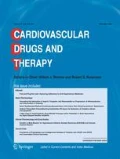Abstract
Acetaminophen is a widely used analgesic, and recent studies have shown that it has some benefits in the ischemic heart. The purpose of this study was to test the effects of acetaminophen on infarct size, regional myocardial blood flow and the “no-reflow” phenomenon in a rabbit model of coronary artery occlusion (CAO) and reperfusion. Rabbits were assigned to one of four groups: (1) acetaminophen, 75 mg/kg in 75% ethanol, 30 min before CAO, (2) vehicle at 30 min before CAO, (3) acetaminophen at 18 min after CAO (12 min before reperfusion), or (4) vehicle at 18 min of CAO (n = 10 each group). All rabbits received 30 min of CAO followed by 3 hr reperfusion. The extent of ischemia was similar in all groups comprising 24–27% of the left ventricle. Infarct size (% ischemic zone) was 51 ± 5, 56 ± 3 in groups 1 and 2 (p = ns), 43 ± 3 and 40 ± 4 in groups 3 and 4 (p = ns). Thus acetaminophen did not affect the development of necrosis. Heart rate and blood pressure were unchanged by acetaminophen treatment. Regional myocardial blood flow was similar in all groups during occlusion and at the end of reperfusion. Acetaminophen had no effect on the size of the anatomic zone of no-reflow that developed by 3 hours of reperfusion. We conclude that acetaminophen has a neutral effect in this experimental model of ischemia/reperfusion and appears to be safe in the course of experimental myocardial infarction.
Similar content being viewed by others
References
Merrill G, McConnell P, VanDyke K, Powell S. Coronary and myocardial effects of acetaminophen: Protection during ischemia-reperfusion. Am J Physiol 2001;280:H2631–H2638.
Golfetti R, VanDyke K, Rork T, Spiler N, Merrill G. Acetaminophen in the post-ischemia reperfused myocardium. Exp Biol Med 2002;227:1031–1037.
Merrill GF, Goldberg E. Antioxidant properties of acetaminophen and cardioprotection. Basic Res Cardiol 2001;96:423–430.
Merrill GF. Acetaminophen and low-flow myocardial ischemia: Efficacy and antioxidant mechanisms. Am J Physiol 2002;282:H1341–H1349.
Coker SJ, Parratt JR, Ledingham IM, et al. Thromboxane and prostacyclin release from ischemic myocardium in relation to arrhythmias. Nature 1981;291:323–324.
Thiemermann C, Zacharowski K. Selective activation of E-type prostanoid (3)-receptors reduces myocardial infarct size. A novel insight into the cardioprotective effects of prostaglandins. Pharmacol Ther 2000;87:61–67.
Xiao CY, Hara A, Yuhki K, et al. Roles of prostaglandin I(2) and thromboxane A(2) in cardiac ischemia-reperfusion injury: A study using mice lacking their respective receptors. Circulation 2001;104:2210–2215.
Friedman PL, Brown EJ, Jr, Gunther S, Alexander RW, Mudge GH, Jr, Grossman W. Coronary vasoconstrictor effect of indomethacin in patients with coronary artery disease. N Engl J Med 1981;305:1171–1175.
Position of the American Heart Association on research animal use. Circulation 1985;71:849A–850A.
Jenkins WL. Pharmacological aspects of analgesic drugs in animals: An overview. J AM Med Assoc 1987;191:1231–1240.
Bellows SD, Hale SL, Kloner RA. Acute ethanol does not protect against ischemic/reperfusion injury in rabbit myocardium. J Thrombosis Thrombolysis 1996:181–184.
Chandrasekharan NV, Dai H, Roos KL, et al. COX-3, a cyclooxygenase-1 variant inhibited by acetaminophen and other analgesic/antipyretic drugs: Cloning, structure, and expression. Proc Natl Acad Sci USA 2002;99:13926–13921.
Krenz M, Baines CP, Heusch G, Downey JM, Cohen MV. Acute alcohol-induced protection against infarction in rabbit hearts: Differences from and similarities to ischemic preconditioning. J Mol Cell Cardiol 2001;33:2015–2022.
Krenz M, Baines CP, Yang XM, Heusch G, Downey JM, Cohen MV. Acute ethanol exposure fails to elicit preconditioning-like protection in in situ rabbit hearts because of its continued presence during ischemia. J Mol Cell Cardiol 2001;37:601–307.
Author information
Authors and Affiliations
Rights and permissions
About this article
Cite this article
Hale, S.L., Kloner, R.A. Acetaminophen and Experimental Acute Myocardial Infarction. Cardiovasc Drugs Ther 18, 121–125 (2004). https://doi.org/10.1023/B:CARD.0000029029.90975.51
Issue Date:
DOI: https://doi.org/10.1023/B:CARD.0000029029.90975.51




